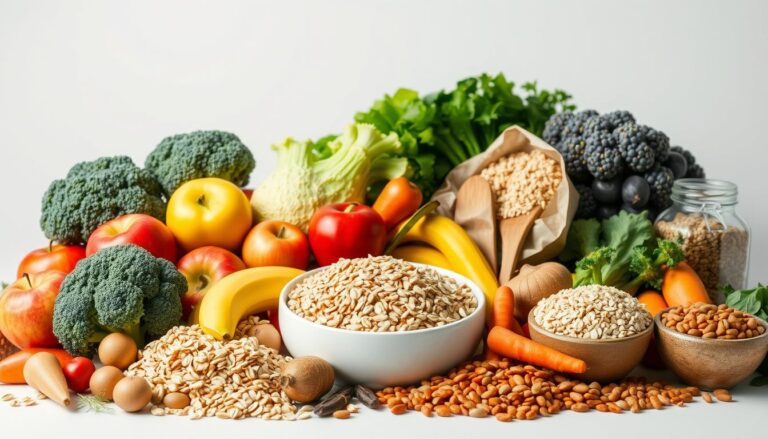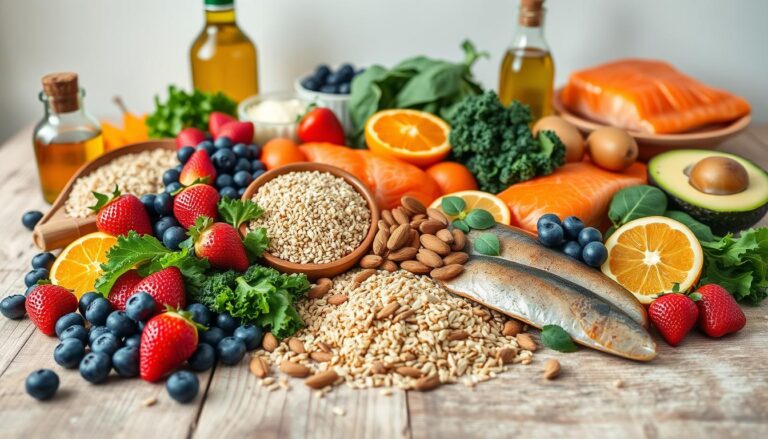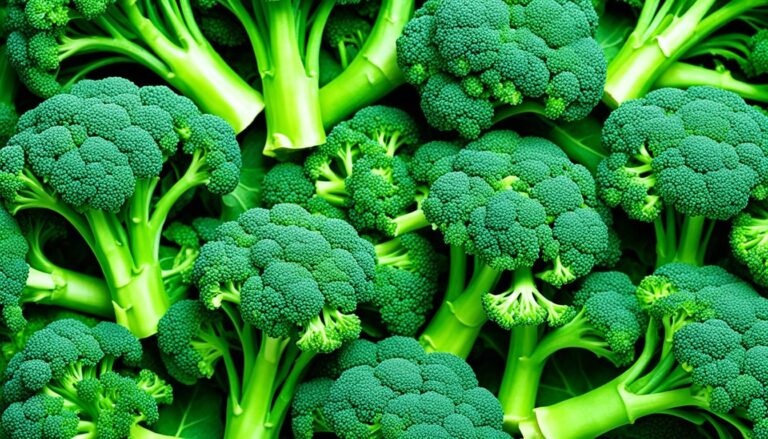In today’s fast world, processed foods are everywhere. But, they might be harming your health. Have you thought about how much they contribute to obesity and other health problems?
Studies show that ultra-processed foods make up 25–60% of our daily calories. These foods, like ready meals and processed meats, are full of sugar and unhealthy fats. Eating them can lead to weight gain and increase the risk of diseases.
Key Takeaways
- Ultra-processed foods make up a significant portion of the global diet, accounting for 25-60% of daily energy intake.
- Eating more than 4 servings of processed food daily increases the risk of all-cause mortality by 18% per serving.
- Highly processed foods are often high in added sugars, leading to obesity, metabolic syndrome, and type 2 diabetes.
- Ultra-processed foods are low in essential nutrients compared to whole or minimally processed foods.
- Cutting down on processed foods and choosing whole, nutrient-dense options can have significant health benefits.
Understanding Processed Foods: From Natural to Ultra-Processed
The way we eat has changed a lot, with more processed and ultra-processed foods around. It’s key to know how these foods affect our health. We need to look at the different types of food processing and the NOVA classification system.
Different Categories of Food Processing
Food processing uses many techniques, from simple steps like cutting and drying to complex industrial methods. The NOVA system groups foods into four types based on how much and why they’re processed:
- Unprocessed or minimally processed foods: These are whole foods like fruits, veggies, grains, and lean meats. They haven’t been changed much.
- Processed culinary ingredients: These are things like oils, butter, and sugar. They’re made from whole foods and used in cooking.
- Processed foods: These are foods made to last longer, taste better, or be easier to use. Examples are canned veggies, cheese, and bread.
- Ultra-processed foods: These are made in factories and often have artificial stuff in them. Think of packaged snacks, sugary drinks, and frozen dinners.
NOVA Classification System Overview
The NOVA system helps us understand how much food is processed and its health effects. Eating too much of ultra-processed foods can lead to health problems like obesity and heart disease.
Common Examples of Processed Foods
Ultra-processed foods are a big part of what we eat, making up to 60% of our calories. Here are some examples:
- Packaged snacks (e.g., chips, crackers, cookies)
- Breakfast cereals
- Sugary drinks (e.g., soda, sports drinks, juice drinks)
- Frozen meals and microwavable dinners
- Processed meats (e.g., hot dogs, sausages, deli meats)
Knowing about food processing levels and the NOVA system helps us choose better. It’s about making healthier food choices for our health.

| Food Processing Category | Examples | Health Implications |
|---|---|---|
| Unprocessed or Minimally Processed | Fruits, vegetables, grains, lean meats | Generally associated with better health outcomes |
| Processed Culinary Ingredients | Oils, butter, sugar | Can be part of a healthy diet when consumed in moderation |
| Processed Foods | Canned vegetables, cheese, breads | May contain added salt, sugar, or unhealthy fats |
| Ultra-Processed Foods | Packaged snacks, breakfast cereals, sugary drinks, frozen dinners | Linked to increased risks of obesity, type 2 diabetes, heart disease, and other health issues |
What are the dangers of processed foods?
Processed foods are everywhere in our diets today. But they pose serious health risks. Studies link them to over 30 health issues, like obesity and heart disease.
Research shows eating more processed foods can lead to early death. It’s especially true for heart disease and diabetes. People eating the most processed foods were 39% more likely to get high blood pressure.
Those who eat the most processed foods face a 24% higher risk of heart attacks and strokes. Every 10% more processed food in your diet increases heart disease risk by 6%.
| Statistic | Insight |
|---|---|
| More than half of the energy (calories) an average person in the UK consumes comes from ultra-processed foods. | Processed foods have become a significant part of the modern diet, posing health risks. |
| A study from 2019 in Spain showed that individuals consuming the highest amount of ultra-processed foods were 62% more likely to have died after an average of 10.4 years compared to those with the lowest consumption. | Consuming large amounts of ultra-processed foods is associated with a higher risk of premature death. |
| Observational studies have established associations between ultra-processed foods and negative health outcomes, although they cannot definitively prove causation. | While the link between processed foods and health risks is clear, more research is needed to fully understand the causal relationships. |
The dangers of processed foods are clear. It’s crucial to know the health risks of a diet full of these foods. By choosing whole, nutrient-rich foods, we can improve our health and well-being.
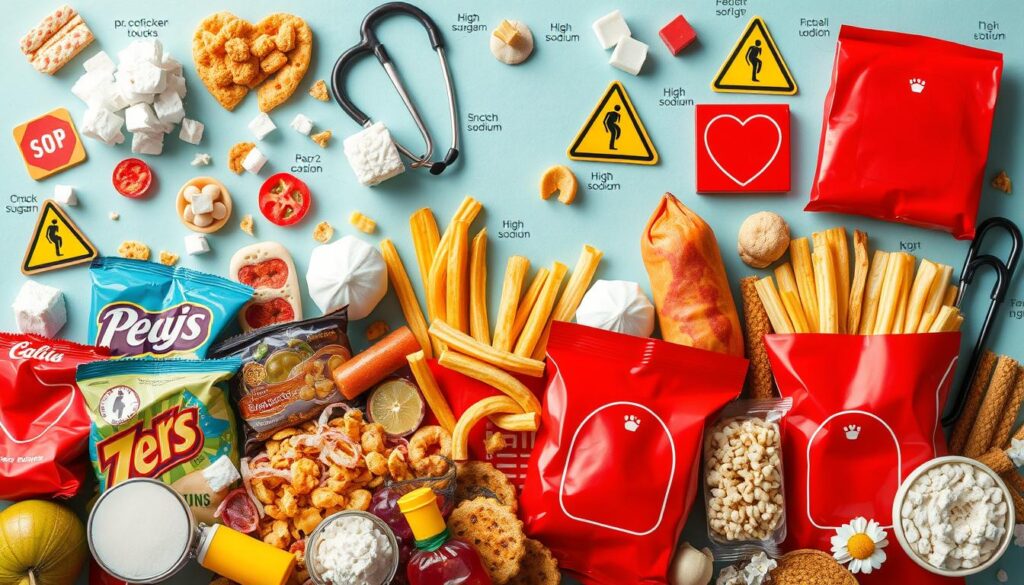
The Hidden Impact of Chemical Additives and Preservatives
Many processed foods have chemical additives and preservatives. These include artificial colors, flavors, and texturing agents. While some have been tested for safety, their long-term health effects are still debated.
Common Artificial Ingredients
- Artificial colors (e.g., FD&C Red No. 40, Yellow No. 5)
- Artificial flavors and flavor enhancers (e.g., monosodium glutamate, artificial sweeteners)
- Preservatives (e.g., sodium benzoate, BHA, BHT)
- Emulsifiers and stabilizers (e.g., polysorbates, carrageenan)
Long-term Health Effects of Food Additives
Research shows these additives can lead to health problems. These include allergic reactions, digestive issues, and hyperactivity in kids. They may also increase the risk of obesity, diabetes, heart disease, and some cancers.
Understanding Food Label Ingredients
It’s important to read food labels to avoid harmful additives. Look for products with simple, recognizable ingredients. By choosing wisely, you can reduce your intake of chemicals in your diet.

| Ingredient | Potential Health Concerns |
|---|---|
| Artificial Colors | Hyperactivity, allergic reactions, possible cancer risk |
| Artificial Sweeteners | Disruption of gut microbiome, increased appetite, weight gain |
| Preservatives (BHA, BHT) | Potential carcinogenic effects, hormone disruption |
| Monosodium Glutamate (MSG) | Headaches, nausea, possible neurological effects |
Sugar, Salt, and Unhealthy Fats: The Troublesome Trio
Ultra-processed foods are often loaded with added sugars, salt, and unhealthy fats. These ingredients are harmful to our health. They can lead to obesity, heart disease, and diabetes.
In the United States, people eat about 152 pounds of sugar and sweeteners yearly. This number is even higher in Europe and Australia. Too much sugar can cause weight gain and increase the risk of chronic diseases.
Salt is important for our body’s functions. But eating too much sodium can raise blood pressure and harm the heart. Experts say we should not eat more than 2 grams of salt daily. Yet, many of us eat much more.
Unhealthy fats, especially trans fats, are found in many processed foods. Eating just 2% more trans fats can increase heart disease risk by 23%. The Danish government has set a limit of 2% of total fat content in processed foods.
“High intakes of energy, salt, saturated fat, and sugar elevate the risk of chronic diseases like heart disease, cancer, and diabetes.”
It’s important to cut down on added sugars, sodium, and unhealthy fats. Food companies are starting to make healthier choices. For example, the UK has a salt reduction program, and Nestlé is lowering sugar in some products.
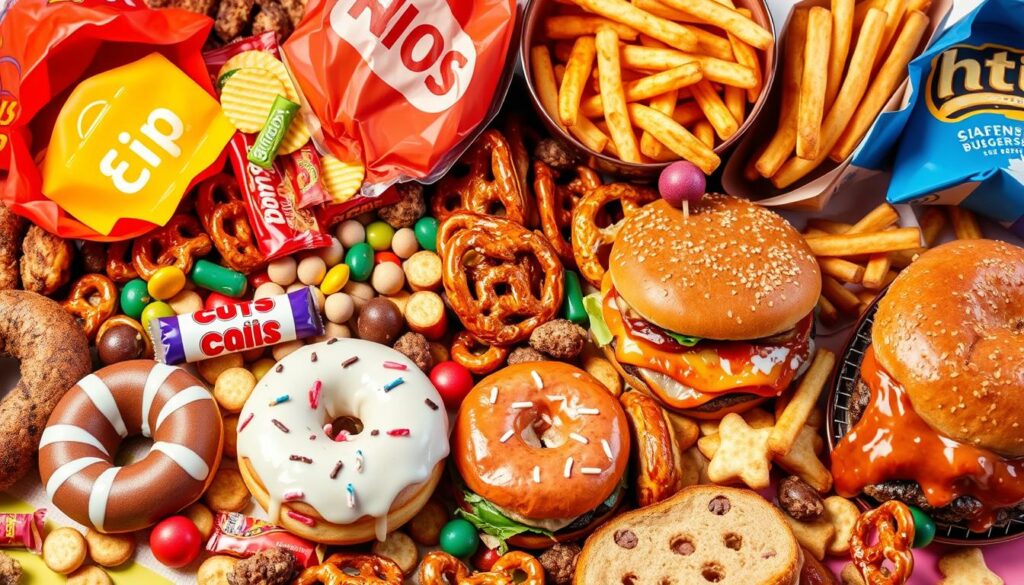
By knowing the risks of these ingredients and trying to eat less of them, we can improve our health. This is a big step towards a healthier future.
Processed Foods and Weight Gain Connection
Processed foods and weight gain are linked in a worrying way. Research shows that these foods can harm our metabolism and lead to eating too many calories. This results in unwanted weight gain.
Impact on Metabolism
Ultra-processed foods are made to be very tasty and hard to stop eating. They can mess with our body’s hunger signals, making us eat more than we need. This can slow down our metabolism and make weight gain worse.
Caloric Density and Portion Control
Ultra-processed foods are high in calories because of added sugars, unhealthy fats, and refined carbs. They have a lot of calories in a small amount. This makes it hard to control how much we eat, leading to weight gain.
A study showed that people eating ultra-processed foods ate 508 more calories a day. They gained 2 pounds (0.9 kg) in 2 weeks. Those eating less processed foods lost 0.9 kg.

This study highlights how big a role ultra-processed foods play in our health and weight management. Choosing whole, minimally processed foods is key to staying healthy and avoiding obesity.
Cardiovascular Risks and Blood Sugar Impact
Ultra-processed foods have become very popular, but they’re harming our health. These foods are made in factories and are linked to heart disease and type 2 diabetes.
Research shows that eating more ultra-processed foods raises the risk of heart disease by 7%. People who eat the most of these foods are more likely to be overweight or obese. They also face a higher risk of having too much fat around their belly.
The problem with these foods is their high levels of unhealthy fats, added sugars, and chemicals. These can quickly raise blood sugar and insulin levels. This can lead to insulin resistance, metabolic syndrome, and type 2 diabetes.
Heart disease is another big worry. Studies have found that certain ultra-processed foods, like processed meats and sugary drinks, increase heart disease risk. These foods are high in calories, unhealthy fats, and lack important nutrients, harming heart health.
| Health Concern | Impact of Ultra-Processed Foods |
|---|---|
| Cardiovascular Disease | 7% increase in risk per daily serving |
| Obesity | 31-97% higher odds of being overweight or obese |
| Type 2 Diabetes | Increased risk due to blood sugar and insulin spikes |
The evidence is clear: cutting down on ultra-processed foods and choosing whole foods is key. It can greatly improve heart health and blood sugar control. Making smart food choices is vital in the battle against these serious health issues.
Nutritional Deficiencies in Processed Foods
Ultra-processed foods have become a big problem for our health. These foods are often very low in nutrients compared to whole foods. Even though some processed foods have added vitamins and minerals, they miss out on many good things found in natural foods.
Lost Nutrients During Processing
Ultra-processed foods lose a lot of nutrients during their making. Heat and chemicals are used to make them last longer and taste better. But this process takes away a lot of the good stuff, leaving us without enough vitamins and minerals.
The Fiber Gap in Processed Foods
- Ultra-processed foods usually don’t have much dietary fiber, which is important for our digestion and feeling full.
- Instead of fiber-rich foods like fruits and whole grains, processed foods use refined ingredients.
- This lack of fiber can lead to health problems like constipation and an increased risk of diseases like obesity and diabetes.
Our diets are too focused on ultra-processed foods, leading to a big nutritional gap. Eating more whole, minimally processed foods is key to avoiding the health risks of processed foods.
| Nutrient | Whole Foods | Processed Foods |
|---|---|---|
| Fiber | High | Low |
| Vitamins | High | Moderate (often fortified) |
| Minerals | High | Moderate (often fortified) |
| Antioxidants | High | Low |
| Phytochemicals | High | Low |
Ultra-Processed Foods and Mental Health
Research shows a link between ultra-processed foods and mental health problems like depression and anxiety. People who eat more of these foods might face a higher risk of these issues.
A big study with over 31,000 middle-aged women found something scary. Those who ate the most ultra-processed foods had a 50% higher chance of depression. Eating lots of artificial sweeteners raised this risk by 26%.
Why this happens isn’t clear yet. But it might be because these foods lack important nutrients and have artificial additives. These can mess with our gut and brain, affecting our mood.
“Greater consumption of ultra-processed foods was associated with increased odds of depressive and anxiety symptoms. The odds ratio for common mental disorder symptoms was 1.53, with a confidence interval of 95% ranging from 1.43 to 1.63.”
These studies show we should eat less ultra-processed foods and more whole foods. Choosing better foods can help keep our minds healthy and improve our lives.
Our diet greatly affects our mental health. Knowing the risks of ultra-processed foods helps us make better choices. By eating more whole foods, we can protect our mental well-being.
Making Healthier Food Choices: Whole Foods vs. Processed
Choosing whole foods over ultra-processed options is key for a healthier diet. Whole foods, like fresh produce, lean proteins, and whole grains, are full of nutrients. They help keep you healthy. On the other hand, highly processed foods often don’t have these nutrients and can harm your health.
Shopping Guidelines
When you go grocery shopping, look at the store’s perimeter. That’s where you’ll find fresh, less processed ingredients. Try not to spend too much time in the center aisles, which are full of packaged, ultra-processed foods. Make sure to buy a variety of whole foods, including:
- Seasonal fruits and vegetables
- Lean proteins like chicken, fish, and legumes
- Whole grains such as brown rice, quinoa, and whole-wheat breads
- Healthy fats from nuts, seeds, and avocados
Meal Planning Strategies
To eat more whole foods, plan your meals and make a grocery list. Focus on nutritious, minimally processed ingredients. This helps you eat healthier and reduces your need for convenient, ultra-processed foods. Planning ahead lets you make better whole food choices and enjoy a balanced diet.
Choosing a whole food-centric lifestyle is great for your health. By making smart choices at the store and in the kitchen, you can improve your eating habits. This leads to many benefits from a whole food-based diet.
The Environmental Impact of Food Processing
Our diets are changing, with more ultra-processed foods. This shift is causing big environmental problems. These foods now make up over half of what we eat in places like the USA and UK.
Ultra-processed foods need more resources than whole foods. A study in Brazil found they use a lot of sugar cane, milk, wheat, corn, and soy. In Australia, the top ingredients are sugar, wheat flour, vegetable oil, and milk.
This focus on a few crops harms biodiversity. It’s linked to a 13.8% decrease in agricultural biodiversity. Also, raising beef for these foods cuts into food for people, like rice and beans in Brazil.
| Environmental Impact | Contribution of Ultra-Processed Foods |
|---|---|
| Energy use | 17-39% of total diet-related energy use |
| Biodiversity loss | 36-45% of total diet-related biodiversity loss |
| Greenhouse gas emissions | Up to a third of total diet-related emissions |
| Land use | Up to a third of total diet-related land use |
| Water use | Up to a quarter of total diet-related water use |
| Food waste | Significant contributor, especially for bakery, sugar, and confectionery waste |
Ultra-processed foods harm the environment a lot. They use a lot of resources and create a lot of waste. By eating less of these foods and more whole foods, we can help the planet.
“The world’s food systems generate one third of all greenhouse gas emissions. Ultra-processed foods are linked to more greenhouse gas emissions than other food groups.”
Conclusion
It’s hard to cut out all processed foods, but we can try to eat less of them. Choosing whole, nutritious foods can really help our health. Learning to read food labels and picking better options is a good start.
Getting advice from doctors can also help. They can guide us in making better food choices. This way, we can live healthier lives.
Ultra-processed foods are bad for us, causing weight gain and diseases. Eating more natural foods helps us stay healthy. It also keeps us safe from the harm of processed foods.
Our health depends on the food we eat. Making smart choices about food is key. By doing this, we can all live better lives.
